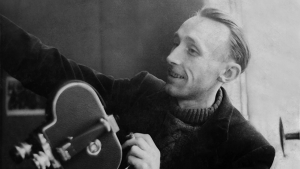André Bazin, film critic, theorist, philosopher, and humanist wrote a series of essays between the years 1944 and 1958, before he died at the young age of 40. He lived during a time when a film was considered simply as a medium of entertainment and was not accorded the status of a piece of art. helped to change the public perspective regarding films through his simple yet strong technique of film criticism. During his days, film criticism was limited to a simple description and evaluation of the film in question. It was Bazin who elevated film criticism to a serious discussion of film as an art form, focusing not just on the content, but also on the techniques of film making used.
Bazin had very strong feelings on many subjects, especially on the subject of montage and realism. In his recognised article “The Evolution of the Language of Cinema”, he explains his theory that montage, although necessary in many cases to make a film work, can be heavily overused. From the start he makes a distinction between “those directors who put their faith in the image and those who put their faith in reality”. Bazin sees cinema as “an idealistic phenomenon” and only consequently technical. Being a humanist he believes that the idea precedes the invention and hence is superior to the technical means used to achieve it. He categorizes the early pioneers (Muybridge, Niepce, Leroy, Demeny, Joy, Edison, Lumiére) as “ingenious industrialists” at best. He later said that he would extrapolate this formula of “idea necessitating technical means” into complexity of subject matter necessitating a new form/style.
To Bazin the cinema is inherently realistic because of the mechanical mediation of the camera. As time evolved so did the means of artistically replicating reality, from cave drawings, to mummification, to engraving, to painting, to photography, and to its (thus far) most convincing form, cinema. The “myth” of total cinema Bazin speaks of is a reflection of humanity’s psychological and indeed ethical, obsession in the arts with depicting reality. Moving on, Bazin believed that a film should represent a director’s personal vision, rooted in the spiritual beliefs known as “Personalism”. These ideas would have a pivotal importance on the development of the auteur theory, the manifesto for which was François Truffaut’s 1954 Cahiers article “A Certain Tendency of the French Cinema”. Bazin also is known as a proponent of “appreciative criticism,” wherein only critics who like a film can write a review of it, thus encouraging constructive criticism.
Dudley Andrew’s biography of Bazin (Dudley Andrew, Andre Bazin, Oxford University Press: New York City, 1978) describes Bazin’s schooling at the hands of Christian Brothers, and how that education had a lifelong influence on him. Another major influence on Bazin and his writing was the influential French film critic Albert Beguin. Beguin became a devout convert to Catholicism and was a writer for a culture magazine that advocated stronger dedication to Catholicism. In 1938 Bazin founded a study group dedicated to discussing Esprit, the Catholic intellectual magazine (Andrew, page 25). Although Bazin was in a number of ways unorthodox in his religious beliefs, and was not a devout Catholic comparable to Beguin and Legaut, his film writing “focused to a remarkable extent on films with a religious dimension” (Andrew, page 23). An entire chapter in Andrew’s biography of Bazin discusses Bazin’s involvement with Catholic film reviewers other Catholic intellectual groups.
André Bazin never made a film, but as one of the history’s most influential writers and commentators on film, his impact on cinema was immense, no doubt. Over his career he wrote about two thousand short articles on films, drawing inspiration from a wide variety of sources including philosopher Jean-Paul Sartre’s ‘les Temps modernes’. Even though filmmaking was not considered a serious profession during his time, he correctly predicted that a day would come when students would study cinema in college. So in a way, I like to think Bazin had something to do with college or university students in filmmaking, like myself, to achieve what they have today.
Reference list:
– http://offscreen.com/view/bazin4
– http://the.hitchcock.zone/wiki/André_Bazin
– http://www.adherents.com/people/pb/Andre_Bazin.html
– http://www.thefamouspeople.com/profiles/andre-bazin-4600.php#DATqB6TAeCFaL1iT.99
Leave a Reply